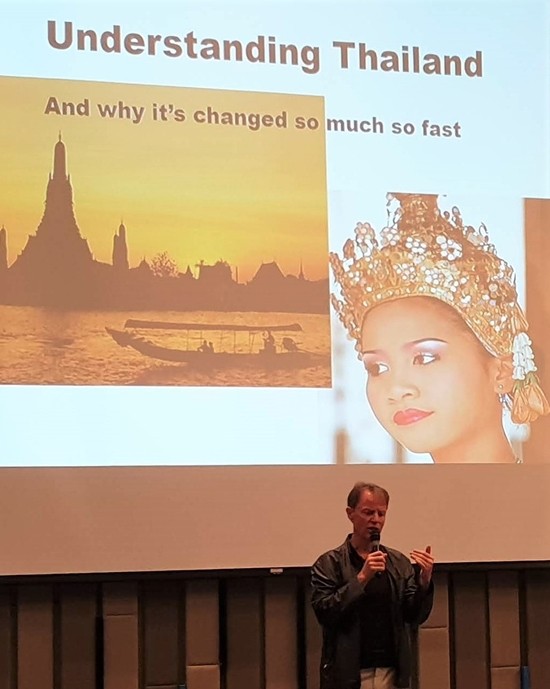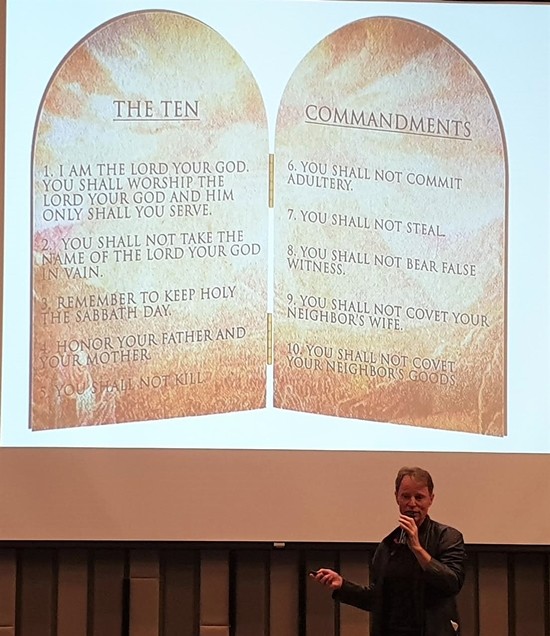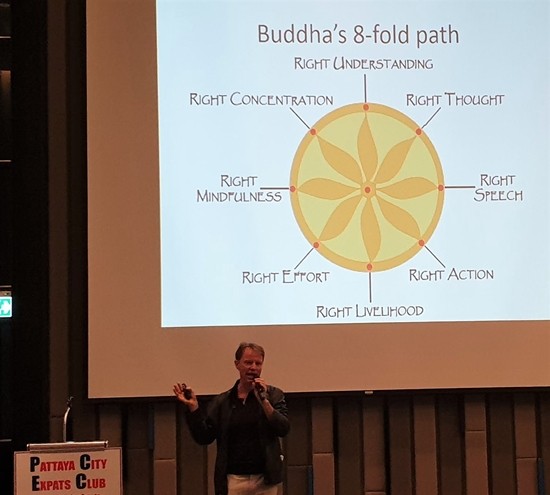
Just in case you hadn’t noticed, Thais and Westerners think differently. Dr Ren Lexander, PhD, outlined some of the key reasons for this in a talk he gave on the 8th December at the Pattaya City Expats Club meeting. A key part of his talk focused on the legacy of religious beliefs in the West and in Thailand.
Even if you are an atheist, your belief system about what makes right and moral action has been influenced by the West’s Judaic-Christian heritage. Much of this is enshrined in the Ten Commandments. These are very black and white: thou shalt/thou shalt not. For instance, ‘Thou shalt not commit adultery’. And ‘Thou shalt not bear false witness’ — which is usually interpreted as “Thou Shalt Not Lie’.

By stark contrast, Thailand is a Theravedic Buddhist country and follows Buddha’s Eight-fold Path: Right Understanding, Right Thought, Right Speech, Right Action, Right Livelihood, Right Effort, Right Mindfulness and Right Concentration. This is much greyer in concept. What is ‘Right Speech’? Perhaps it is telling people what they want to hear rather than what is strictly speaking the truth. By way of comparison, Dr Lexander asked what a husband in the West might say if his wife asks him ‘Does this dress make me look fat?’
So, Thais will tend more towards a greyer version of the truth than Westerners do. Dr Lexander used the example of: If a Thai woman has a sick buffalo upcountry and bending the truth will get her money to look after the poor sick buffalo the Thai might consider that bending of the truth ‘Right Speech’.
There is no Buddhist commandment ‘Thou shalt not commit adultery.’ Dr Lexander showed a graph from a survey which indicated that Thailand has the highest rate of adultery in the world. The figures show that adultery/affairs run at 56% in Thailand. 43% in France. 36% in the UK.
Something to remember is, Thais do not normally do mental arithmetic. Which makes it difficult to assess progress or custom. For example, a regular customer who spends a steady amount every day can be overlooked for a much bigger spender who comes in only once. This means there is little realization that the expat regular customer can often be of more support to local businesses than tourists who quickly come and quickly go.
Marriage, again there is an important difference. In the West, the father ceremonially gives the bride, his daughter, to the man she is marrying. Therefore, she is in effect given away to the husband as they become one. With Thai ceremonies, this does not happen. Their focus is not as much on romantic love or courtly romance but on long-term partnership and also support of their original family.
Karma plays a large part in Thai thinking. Thais believe that the result of any action they take is not just dependent on the action NOW but also the weight of karma – good or bad – from the past. This can surface in a different attitude towards the dangers of driving. Careless actions do not necessarily result in disasters. More likely they believe that accidents and such come from Karma already due. When you have good Karma accrued; you are safe. Thais believe that the best way to make good – ‘Tam Bun’ – is to give support to monks.
Dr Lexander explained that Thais are very hierarchical in their thinking and this too is a result of their belief in karma. People with good karma will end up higher up the hierarchy. Thais believe that, theoretically, every person in the country could be placed in a hierarchy from the top (King/monks) to the bottom. But they don’t necessarily agree about where in the hierarchy they sit.
The body too is judged the same way, head is high, feet are low. So do not touch your girlfriends’ or boyfriends’ head in public or point with your feet. And, if a baht note is blowing away along the street, do not stamp on it to halt its escape… As all banknotes bear the image of the king’s head and putting your disgusting feet on the image of the king is a grievous insult.

Those who have been coming to Thailand for any length of time have witnessed massive and sudden changes in Thailand. One of the factors that Dr Lexander focused on as driving all this change was a massive plummet in the birthrate.
In 1970 it was usual to have nearly 6 children per woman, in 1980 it was 3.39, in 1995 is was 1.87, and in 2016 it was 1.44 about the same as Japan. Imagine that, in 1995, the birthrate had still been at 3.39 children per family. There would right now be twice as many 24 year olds in Thailand. Consider the implications of this for the character of Thailand and Pattaya in particular. The Thai government is now concerned that the birthrate is below the replacement rate and are considering steps to encourage women to have more children. One of the results off this massive plunge in the birthrate has been an expansion in the waistlines of Thai children and adults. There is simply more food to go around each family — for children and adults.

Dr. Lexander’s talk was well received as at the end there were many questions and comments from the audience. To view a video of Dr Lexander’s talk, visit https://www.youtube.com/watch?v=DK1wvT9URck&t=66s.
After the presentation, the MC brought everyone up to date on the upcoming club events and others of interest. This was followed by the Open Forum where questions are asked and answered about Expat living in Thailand, especially Pattaya. For more information about the PCEC, visit their website at: http://pattayacityexpatsclub.com/.





